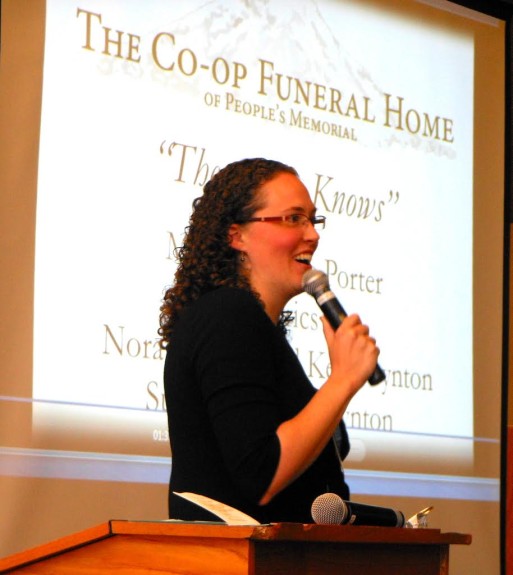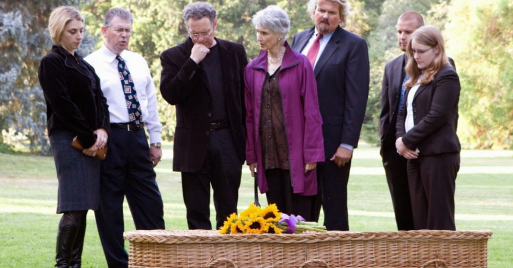Today is part one of SevenPonds interview with Nora Menkin, Managing Director of The Co-op Funeral Home of The People’s Memorial in Seattle. The Co-op Funeral Home of People’s Memorial is one of the only cooperative funeral homes in the country, and here Nora talks about its origins, how it works and how she became involved.

Nora Menkin
Ellary: I understand that The Co-op Funeral Home of People’s Memorial is a funeral home owned by the members of People’s Memorial Association. Will you explain what the People’s Memorial Association is?
Nora: The People’s Memorial Association was founded in Seattle in 1939. It was formed when a group of churches got together to try to find a solution to the high prices that their members were having to pay for funeral services. They thought there had to be a better way.
So, they approached one funeral home in town and said, “We’ll send all of our members to you, but you have to give them a set price that we’ll negotiate with you, a set price that’s a fair price for a simple service. You need to offer this newfangled thing called cremation (cremation was starting to come into the mainstream but wasn’t very popular at the time) if that’s what our families want. There’ll be no sales pressure, and you’ll make up for your loss of revenue from the discount you’re giving everyone by the volume of people we’ll send to you.”
Ellary: How long did that partnership between the People’s Memorial Association and the local funeral home last?
Nora: That partnership lasted for over sixty years until the funeral home got bought out. After Jessica Mitford’s book “The American Way of Death” came out in the sixties, the membership of the People’s Memorial Association grew to over 100,000. There was a lot press being generated, a lot of blow back on the funeral industry. So the membership got really big and extended beyond Seattle. There was also a similar memorial society in Central Washington and in Eastern Washington. In the last twenty years they’ve all merged; we’re all one organization, The People’s Memorial Association, that serves all of Washington.

Ellary: What happened when that funeral home was bought out?
Nora: It was decided after the funeral home got bought out that we wouldn’t contract with any corporate funeral homes anymore. We decided that the funeral homes we worked with had to be independent family-owned funeral homes. We have a set price that we negotiate every two years. We say, “We’ll send our members to you and you’ll give them this set price that we’ve negotiated. If they want something beyond what we negotiated, then they get a 15 percent discount off your normal price list.” Now we’ve got 19 funeral homes across Washington.
Ellary: So The Co-op Funeral Home of People’s Memorial is one of the funeral homes that People’s Memorial Association members go to?
Nora: Yes. We’re unique because we function as a cooperative, so we are owned by the more than 80,000 members of the People’s Memorial Association. All of the members, no matter where they live, own The Co-op Funeral Home. The Co-op Funeral Home serves the Seattle area, which is where most of our members are. We also have partnerships with other funeral homes to offer services that are more local to where the member might live.
Ellary: This is the only funeral home that members of the People’s Memorial Association actually own, this is the only co-op?
Nora: Correct.
Ellary: How involved are the members of the People’s Memorial Association in The Co-op Funeral Home?
Nora: Ninety-nine percent of our members are not involved on a day to day basis, they just call us when they’re in need of services. But we do have some people that are more involved and offer their talents where we need them. We have committees that help run the organization: a finance committee, a marketing committee, a legislative committee that helps us keep an eye on the state legislature so that they don’t pass any laws or policies that are consumer averse. So those are all volunteers, and members serve on those committees, and they can serve on the board of directors.
Ellary: So how did The Co-op Funeral Home of People’s Memorial get started and how closely is it functionally linked to the People’s Memorial Association as an organization?
Nora: Our start up costs were completely raised by donations from our members; we opened our doors in 2007 without any debt. We share a board of directors with the People’s Memorial Association. The PMA is the non-profit side, and then the co-op funeral home is the business. The directors are chosen from our membership, and I report to the Board. Managing Director is my title, and I’m in charge of the funeral home. Kathy Long is the executive director of the People’s Memorial Association. We work very closely together because we have a very closely aligned mission.
Ellary: How long have you been working at The Co-op Funeral Home?
Nora: We opened in 2007 and I started here when our doors opened as an intern. Then I got my funeral director’s license and I was made managing director in 2014.
Ellary: What prompted your interest in getting involved as an intern?
Nora: I got interested in home funerals and the alternative funeral industry because I had two friends die when I was in college. Their funerals were polar opposite examples of how funeral services could be conducted. For one friend, who was Catholic, the family went the traditional funeral route. They had a viewing beforehand and a procession to the church and a procession to the cemetery. Thousands and thousands and thousands of dollars later, no one felt that the experience had been a positive one. There was no sense of closure because the ceremony was completely impersonal. It didn’t speak to who he was as a person at all.
Then the other friend died a sudden death. He’d been in an accident, and the family turned the service over to his friends because we were all theatrical types. They asked us to do something that honored him for who he was. So we put together a video and we chose people to speak about him individually. The family was Christian, and they had a couple of religious elements in the ceremony, but it was basically a ceremony that honored him. I felt much better after that experience. Everyone at the funeral told us how rare it was, and I said to myself, “That’s how it should be for each person.”
So I started looking into the funeral consumer advocacy movement and home funerals and individual ways to honor people and give people choices. I was very interested, so I came on board and got trained. I did apprenticeship hours as an intern, and then sat for my funeral director license exam. And I’ve been here ever since.
Come back next week for part two of our interview with Nora!

 What Is The Benefit of A Member Owned Cooperative Funeral Home? An Interview with Nora Menkin, Part One
What Is The Benefit of A Member Owned Cooperative Funeral Home? An Interview with Nora Menkin, Part One



 Forest Bathing Eases Grief by Soaking in Nature
Forest Bathing Eases Grief by Soaking in Nature
 The Spiritual Symbolism of Cardinals
The Spiritual Symbolism of Cardinals
















Thanks for talking with me! Two little corrections. It is a 15% negotiated discount with other funeral homes when families request something not previously negotiated, not 50%. Blame the phone call for that error in translation. And our website is “www.funerals.coop” no .com necessary!
Report this comment
I’m sorry for my delayed reply. Thanks for your wonderful interview and these corrections were made awhile back! 🙂
Report this comment
What a brilliant idea. I’d like to be part of a funeral home co-op in LA. Thanks for this interview Nora and Ellary.
Report this comment
I’m glad you enjoyed this interview! Thank you for visiting! 🙂
Report this comment